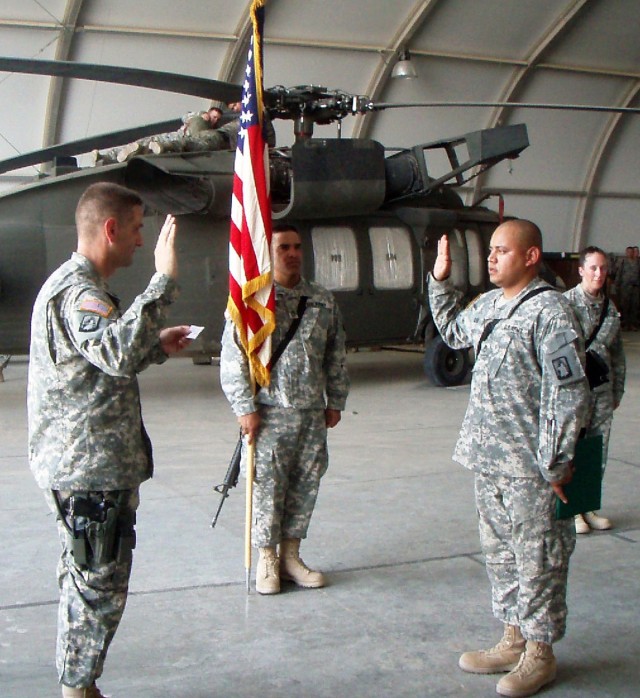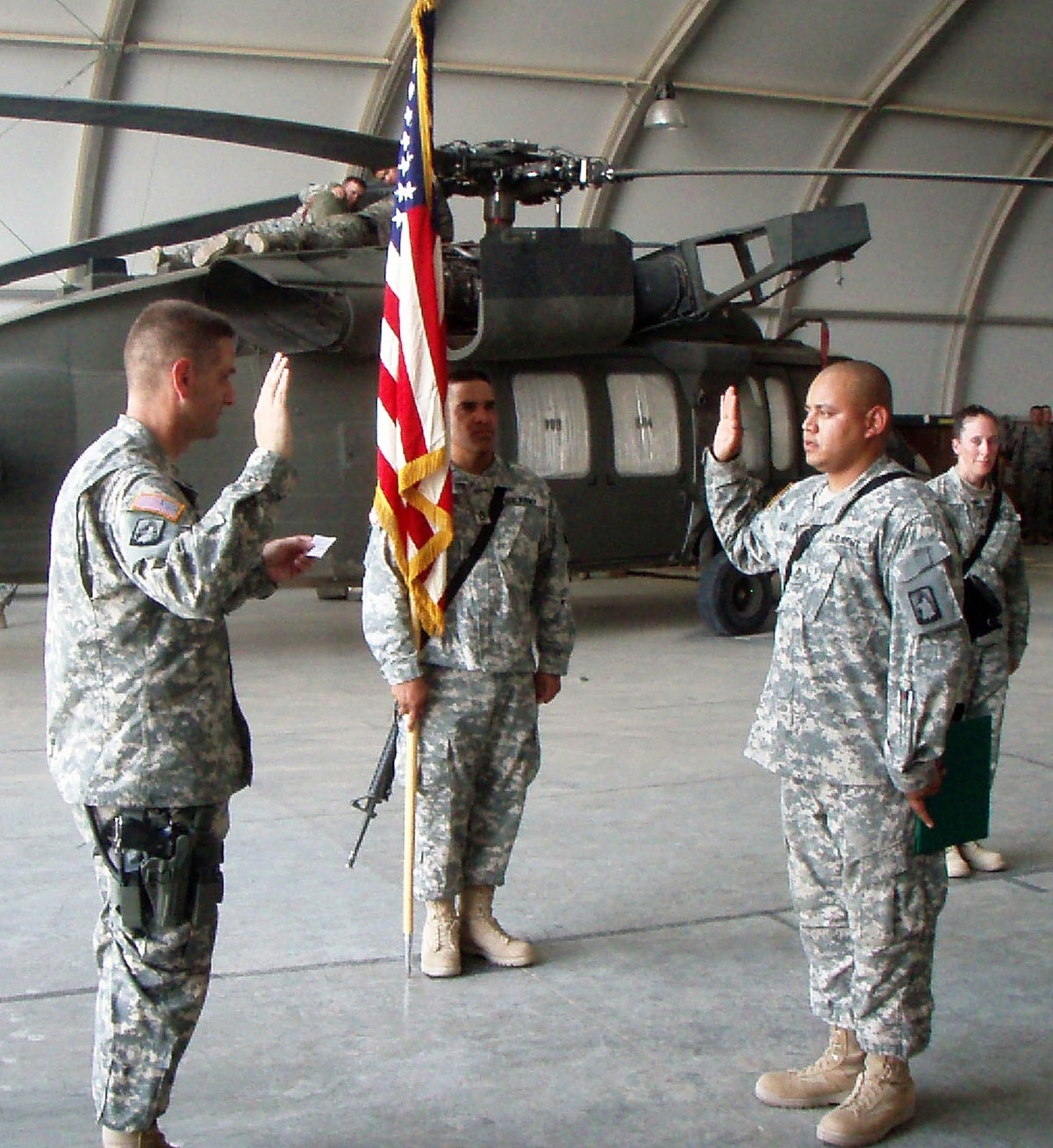
HEIDELBERG, Germany -- As the United States military celebrates the 35th anniversary of America's all-volunteer force this year, there are signs that U.S. Army Europe Soldiers are helping to keep alive the spirit that makes a volunteer force possible.
In the years since the last draft at the end of the Vietnam War, Americans have continued to volunteer for the armed forces to support and defend the Constitution, and the Army has kept its ranks filled in spite of numerous conflicts, long deployments, separation from home, and hazardous duty.
For example, in terms of Soldiers reenlisting for the first time, this year USAREUR has "exceeded (its) objective by far," said USAREUR Retention Sgt. Maj. David Best.
"All these Soldiers came on active duty after the war started. That relationship is special because these are Soldiers that say, 'I understand what's going on. My eyes are open. This is what I want to do. I believe in my country. I believe in my mission,' and I think that's a huge, huge bonus. That's why we still have a volunteer Army -- because they're not getting out -- they're staying," he said.
The Department of the Army goal for this fiscal year is about 65,000 reenlistments, and that objective should also be reached with greater ease than ever, Best said.
"We are on track to make that mission by the end of the month, which will be the earliest on record since those records have been kept ... and that's incredible," he said.
Despite being deployed to Iraq since last summer, retention officials in USAREUR's 12th Combat Aviation Brigade announced in June that the 12th had already exceeded its reenlistment target for the year, with more than 500 CAB Soldiers choosing to extend their tours in the Army. This week the brigade announced that since June its re-up totals had doubled to more than 1,000, a figure they say means that half the enlisted Soldiers who deployed with the 12th have now reenlisted during its combat tour in Iraq.
Just as significant as the numbers is the fact, USAREUR retention officials say, that while Soldiers continue to volunteer to extend their terms of enlistment for the Army's benefits, many choose to stay solely out of a sense of duty and because they believe Army service allows them to take part in something larger than themselves.
"A lot of people are quick to assume that it's the money that makes all these Soldiers reenlist, but that's not always the case," said Master Sgt. Joseph Organ, the 12th CAB senior career counselor, when the brigade surpassed its reenlistment goal in June. "Nearly
100 of our Soldiers reenlisted for (the) needs of the Army, and they didn't get a bonus or a duty station. "
"Most of the people who are in the military right now have an extreme sense of patriotism," said Staff Sgt. Harvey Walker, V Corps Special Troops Battalion retention NCO.
"I think that most Soldiers and Families realize that there's a degree of sacrifice. Some people may differ on their opinions on how extensive that degree is, but on a very basic level the security that the Army provides far outweighs anything else that goes along with it," Walker said.
Sgt. Nekisha Hegler, V Corps STB personnel NCO, is a single mother who said she reenlisted July 9 because she feels the military gives her the best resources to take care of her daughter.
"I decided to stay in and take care of her because I feel that the military is the best way to do it, because (with benefits such as) medical, everything, my daughter's taken care of. Anywhere I go she's taken care of," Hegler said.
In addition to knowing her family is cared for, Hegler said she enjoys her job in the Army because it allows her to help fellow Soldiers.
"I'm contributing to other peoples lives," she said. "By working in personnel I know that everything I do is important, and I want to keep doing it, even on the outside when I retire. I want to keep continuing to benefit somebody else's life," she said.
"Knowing that I am serving my country also gives me that feeling that the people who aren't serving, are being protected," said Spc. James Mitchell, a mechanic in the V Corps STB motor pool who reenlisted July 8.
"I have two nephews and two nieces, and with me being in the military I know that they'll have what is necessary to go about their daily lives (and) not live in fear," said Mitchell.
Although some may argue that with all of the benefits the Army provides its Soldiers the true spirit of volunteerism may not be as alive today as it was in the past, Walker disagrees. "It's honorable. It really is," he said.
"I hate to hear people say that by making the Montgomery GI Bill more lucrative, it's going to make Soldiers want to get out of the Army," Walker added. "They should know that we're intelligent, competent and patriotic enough, that we can still get our education and have a desire to serve."
"I think patriotism and a sense of belonging are the top two reasons that Soldiers reenlist," said Best.
The successes the Army and USAREUR have achieved in sustaining America's all-volunteer force have also paid benefits for USAREUR's support of U.S. European Command theater security cooperation efforts.
Over the past decade, many eastern European armies have been transforming from conscript forces to professional, volunteer services, and USAREUR and EUCOM officials have aided in those efforts by sharing their knowledge of what America's Army has learned since it ended the draft in 1973.
"Most of these nations are the exact same as we were in 1973, when we started from draft to volunteer," said Command Sgt. Maj. Mark Farley, the U.S. European Command's senior enlisted leader, during a conference of European senior NCOs last month. "And we had some issues. We had problems we had to work through, and that's what they've got, so we're ... trying to get them to identify what it is they expect ... and then how can we assist them in getting them to do that."
Farley said helping those nations make the shift to volunteer forces takes convincing them to make changes across their entire defense structures, not just to eliminate conscription.
"When we went from a conscript military, the draft, in '73, to a volunteer military, we changed the structure ... a lot of these countries haven't done that," he said. "They bring in a change, and they try to change. Well, you've got to change everything. You just can't say, 'I'm not going to draft people.'"
At that same conference, former USAREUR Command Sgt. Maj. Iuniasolua Savusa said that while benefits are important to Soldiers, caring leadership and a sense of duty and mission are equally responsible for keeping them in the Army.
"In order to retain a Soldier -- a professional Soldier in the Army -- it goes beyond pay," he said. "It's about the quality of life he receives and the type of leadership that he falls in on, and how much they care about him as an individual in order to train him for his ultimate mission."

Social Sharing